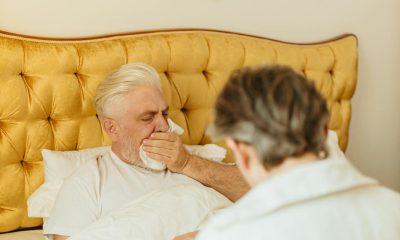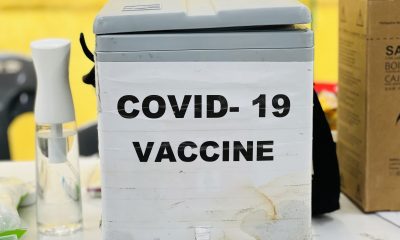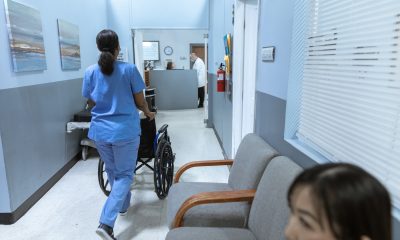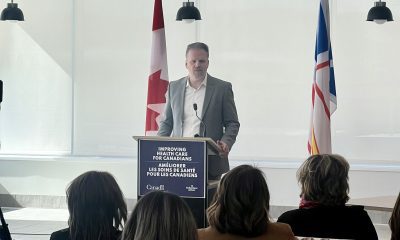Headline
DOH conducts community-based training programs for treatment and rehabilitation of drug users

Dr. Alfonso Villaroman (left), special assistant to Department of Health (DOH) Assistant Secretary Elmer G. Punzalan, explains why the Health Department is conducting community-based training program among doctors from local government units in the National Capital Region (NCR) during the Philippine College of Physicians Health Forum held at Annabel’s Restaurant in Tomas Morato Ave., Quezon City on Tuesday (Aug. 2, 2016). He said the training program is designed to strengthen the doctors’ knowledge and better understanding on how they can properly assess the drug dependents/users as part of the DOH’s intervention programs for the big number of drug surrenderers in the country. Also present in the forum were Dr. Clara Fuderanan (center), a psychiatrist of the Philippine College of Addiction Medicine (PCAM) and another official of the DOH in its Drug Treatment and Abuse Program; and Dr. Myra Dee Lopez-Roces from the Philippine Psychiatric Association. (Photo: Johnny Guevarra/PNA)
MANILA – The Department of Health (DOH) announced on Tuesday the launching of its series of Community-Based Training Programs as part of its intervention programs for the big number of drug surrenderers in the country
In a health forum spearheaded by the Philippine College of Physicians (PCP) and held at Annabel’s Restaurant in Tomas Morato Ave., Quezon City, Dr. Alfonso Villaroman, special assistant to DOH Assistant Secretary Elmer G. Punzalan who heads matters pertaining to drug abuse and rehabilitation, said that the first batch of the participants in the training are doctors from the Local Government Units (LGUs) in the National Capital Region (NCR).
Dr. Villaroman explained that the training will be conducted for four days in order to strengthen the doctors’ knowledge and better understanding on how they can properly assess the drug dependent/user surrenderers to ensure that proper recommendations can be made for them.
He said it is important that doctors can properly determine also the level of addiction of a patient so that they can classify what kind of intervention is needed.
He added that assessment is needed to find if the patient needs to be treated as outpatient, provided with counseling by psychiatrist, or requires to be referred to a mental health institution or facility wherein his or her condition can be managed.
“We have to increase the people’s competence in dealing with drug dependency in the community. We have to strengthen the facilities and rehabilitation centers. We have to train staffs that are going to be helping (in the process),” Dr. Villaroman said.
According to him, the training program will also cover social workers so that they can determine the kind of assistance programs and referrals that should be provided among drug-abused patients belonging to the indigent sector.
He further said that they want to spread out the training program through the community level in the different regions of the country as the training progresses.
Part of the training will also involve strengthening of researches and studies which will be done in coordination with the Department of Education (DepEd).
Dr. Villaroman, who also holds the position as Chief Program Officer of the DOH in Camp Bagong Diwa, Bicutan, Taguig City, said it is important to determine who among the surrenderers are experimental users, occasional users, regular users, and intensified users (prone to develop mental disorders and other health-issues as consequence).
He said that the labeling will then become a determining factor if the surrenderers are just needing counseling, be classified as outpatient (non-residential treatment), be an inpatient (residential treatment) to rehabilitation programs, just needing psychological advices or requiring a referral to a mental health institution.
The labeling will also determine who among them need referrals for livelihood or financial assistance.
“So ile-levelize mo. Kapag na-levelize mo na, alam mo kung saan dadalhin. Usually mga occasional, experimenters, puwede sa counseling iyan. Hindi naman kailangang ipasok sa rehab iyan. It’s like trying to kill a worm with a shotgun…,” he said.
Prior to the start of the conduct of the community-based training program to help treat and rehabilitate drug users, the DOH has already begun to formulate the intervention program in coordination with different stakeholders and government agencies as mandated in Republic Act No. 9165, otherwise known as the Dangerous Drugs Board Act or Comprehensive Dangerous Drugs Act of 2002.
During the last election campaign period wherein then presidential candidate and now President Rodrigo R. Duterte expressed how he hated drugs and determined to crush it, bulk of drug addict surrenderers was already predicted.
For that fear, a lot of surrenderers started to come out and expressed desire to renew themselves, which then prompted the DOH and other concerned agencies to perform their mandate of providing treatment and rehabilitation as part of their commitment toward the “Health for All, All for Health” battle cry.
“Addiction is a disease. It’s a brain disease. It is brought about by imbalance of chemicals in the brain because of chemicals that you put in your body. Nagkakaroon ng long lasting effect,” Dr. Villaroman explained.
He said that they are making the treatment and rehabilitation as intervention program to help the patients become sober and avoid using drugs again.
He said it is important that family support group will also come along as the patient undergoes that phase because in some cases, family and financial problems can also be traced as reasons why some people are hooked to drug addiction.
Also present in the forum were Dr. Clara Fuderanan, another official of DOH in its Treatment and Abuse Program, and Dr. Myra Dee Lopez-Roces, a psychiatrist from the Philippine Psychiatrist Association (PPA).





















